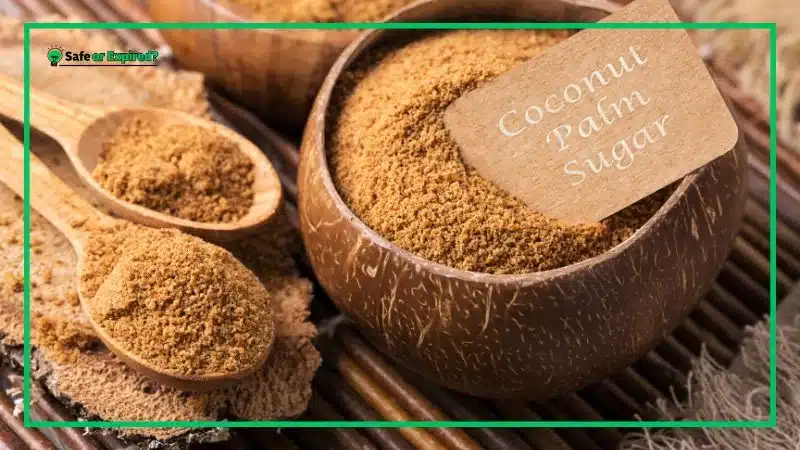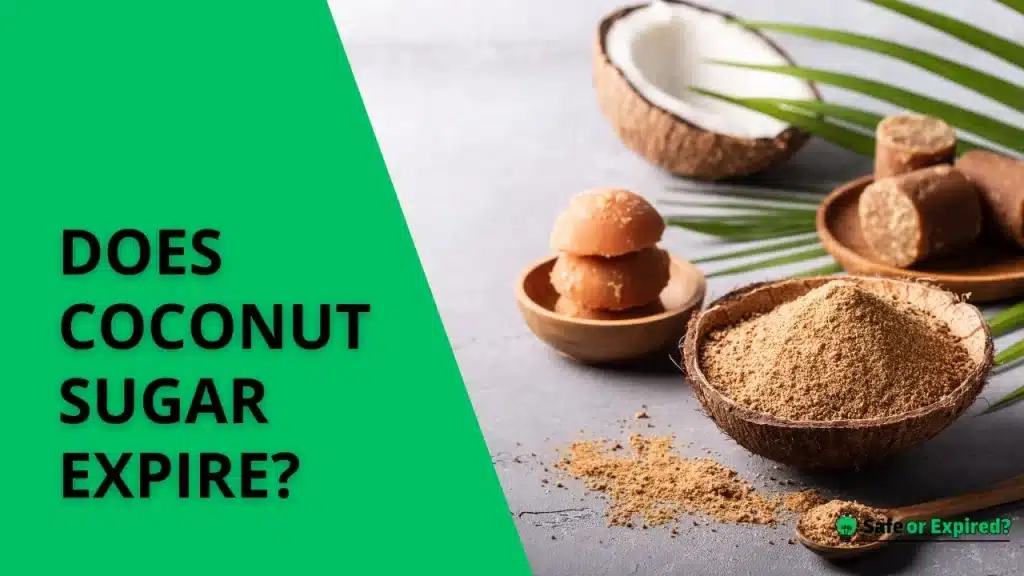“Does coconut sugar expire?” is a question many of us ponder as we rummage through our pantry essentials. Unfortunately, it does go bad, and it’s crucial to know when and how.
This article will break down everything you need to know about coconut sugar’s shelf life, how to spot when it’s not good anymore, and easy ways to make sure it stays fresh for your next baking adventure. Let’s dive in and make sure your coconut sugar is always ready for action!
Does Coconut Sugar Expire?
Yes, coconut sugar does expire. However, it has a notable shelf life due to its low moisture content. Its natural composition keeps it stable and flavorful, making it a reliable pantry staple. However, you should know about the difference between best by and actual expiration.
The “best before” date is about quality, not safety. It tells you when the product is expected to maintain its best flavor and texture. Coconut sugar, with its low moisture content and rich mineral profile, doesn’t spoil easily but might lose some of its gourmet qualities over time.
Moreover, coconut sugar is made from the sap of the coconut palm tree, boiled and dehydrated. This process creates sugar with a unique composition, including a small amount of fiber and nutrients like iron, zinc, calcium, and potassium. These elements contribute to its stable shelf life. Unlike refined sugars, which can clump and harden over time, coconut sugar’s natural composition helps it maintain a consistent texture and quality.

Now, the question is: Does coconut sugar expire in fridge? While not necessary, refrigeration can help in very humid environments. In general, a cool, dry pantry is sufficient. Coconut sugar’s enemy is moisture, so as long as it’s kept in an airtight container away from humidity, it should last well beyond its “best before” date without needing to be refrigerated.
How Long Does Coconut Sugar Expire?
Coconut sugar typically expires in two years. Thanks to its low moisture content, coconut sugar keeps its sweet charm for up to two years, maybe even longer. This isn’t just great news for your pantry’s shelf life; it’s a testament to how enduring natural products can be.
The most recommended storage spot for coconut sugar is a cool, dry pantry or a kitchen counter away from direct sunlight and sources of heat. In such conditions, coconut sugar can comfortably last up to two years or even more without a noticeable decline in quality.
Interestingly, storing coconut sugar in the refrigerator is generally not advised. The fridge environment can introduce moisture to the sugar due to condensation, which may lead to clumping or even mildew in extreme cases.
While unusual, freezing coconut sugar is a viable option for extending its shelf life well beyond the typical two-year mark.
Here’s a table to sum up the details.
| Storage Location | Opened | Unopened |
| Counter | Up to 2 years in an airtight container. | Up to 2+ years in an airtight container. |
| Fridge | Not recommended; risk of moisture. | Not recommended; use an airtight container if necessary. |
How To Tell if Coconut Sugar Is Bad? The Key Signs
To determine if coconut sugar has gone bad, check for unusual odors, clumping, mold growth, off tastes, or color changes. Fresh coconut sugar should smell sweet, be free of mold, maintain a granular texture, and retain its natural light brown color.
Unusual Smell
Wondering what does coconut sugar smell like? Fresh coconut sugar emits a pleasant, sweet smell, reminiscent of caramel. An indicator that your coconut sugar might have gone bad is a noticeable change in its aroma. If it starts smelling sour, musty, or just “off” compared to its usual sweet scent, it could be a sign of spoilage, possibly due to moisture exposure or contamination.
Clumping and Hardening
It’s normal for coconut sugar to form small clumps due to its natural moisture content. However, if the sugar has turned into hard, solid blocks that you can’t easily break apart with a spoon or by hand, this could be a sign of excessive moisture exposure. While clumping itself isn’t a sure sign of spoilage, extreme hardening might indicate that the sugar has absorbed too much moisture and could potentially harbor mold.
Mold Growth
The most definitive sign that coconut sugar has gone bad is the presence of mold. Mold can appear as fuzzy spots of various colors, not just the typical green or black. This usually occurs when the sugar has been stored in a damp environment. If you see mold, discard the sugar immediately to avoid health risks.
Off Taste
If you’re unsure about the quality of your coconut sugar based on its appearance or smell, a taste test can help. Fresh coconut sugar should taste sweet with a hint of caramel. If it tastes sour, bitter, or just not right, it’s best to throw it away. A change in taste is a strong indicator that the sugar has spoiled.
Changes in Color
Coconut sugar naturally has a light brown color, similar to raw sugar, but with a finer texture. If you notice any significant changes in its color, such as it turning darker without reason or showing signs of discoloration like white spots, it could be a sign of contamination or chemical changes within the sugar.
Understanding the reasons behind food spoilage is crucial for effective prevention. Explore these reasons in “Decoding the Reasons Behind Food Spoilage.”
How to Properly Store Coconut Sugar To Extend Its Shelf Life?
To extend the shelf life of coconut sugar, store it in an airtight container in a cool, dry spot (away from heat sources). This prevents moisture absorption and keeps the sugar from clumping, ensuring it remains fresh and retains its sweet flavor for up to two years or more.
Choose Airtight Containers for Storage
Coconut sugar’s granular nature makes it susceptible to moisture. Using airtight containers shields it from humidity and air exposure, preventing it from clumping together or losing its texture.
Glass jars with rubber seals or heavy-duty zip-lock bags are excellent choices for airtight storage.
Keep It in a Cool, Dry Place
The pantry or a kitchen cupboard away from windows, stoves, or any heat-generating appliances is perfect. These spots offer the stable, dry environment coconut sugar needs.
Direct sunlight or near the dishwasher, as heat and steam can promote moisture ingress.
Consider the Fridge in Humid Climates
If you live in a particularly humid area, the refrigerator can act as a safe haven for your coconut sugar, keeping air moisture at bay.
Ensure the container is not only airtight but also moisture-proof to prevent the sugar from absorbing refrigerator smells or moisture.
Regular Checks for Freshness
Every now and then, especially before use, give your coconut sugar a quick check for any spoilage. Look for things like mold, unusual odors, or drastic changes in texture.
If you detect any of these spoilage signs, it’s safer to dispose of the sugar to avoid potential health risks.
Freezing for Extended Shelf Life
For those looking to store coconut sugar for extended periods (beyond a year), freezing can be an effective method.
Place the coconut sugar in a freezer-safe, vacuum-sealed package, airtight container, or bag. Make sure to label it with the date to keep track of how long it’s been stored.
It’s easy to follow outdated advice about food preservation. Find out the real story in “Clarifying Myths About Food Preservation.”
FAQ
Does Coconut Flour Expire or not?
Yes, coconut flour can expire. It typically lasts 6-12 months past its “best by” date if stored properly. Note that refrigeration or freezing can delay the expiry and extend its shelf life further.
What Color Is Coconut Sugar? (Know the Answer)
Coconut sugar has a natural light brown to dark caramel color, similar to raw or unrefined sugar, with a slightly granulated texture.
Is Coconut Sugar Healthy or Bad for You?
Coconut sugar is considered healthy. In fact, experts recommend it as an alternative to refined sugars. The reason is the lower glycemic index and trace amounts of vitamins, minerals, and fiber. However, it should still be consumed in moderation as part of a balanced diet.
Conclusion
In summary, while coconut sugar is quite robust when it comes to shelf life, knowing how to store it is super important. Here’s what you’ve learned;
- Coconut sugar rarely spoils but does have a “best before” date for peak quality.
- Storage is key: You should Keep the sugar in an airtight container in a cool, dry spot.
- Signs of spoilage include unusual smells, clumping, and discoloration.
- Its health benefits make coconut sugar a worthy alternative to refined sugars, yet moderation is key.
Armed with these insights, you can confidently use coconut sugar in your culinary creations, ensuring they remain fresh and delightful every time.

